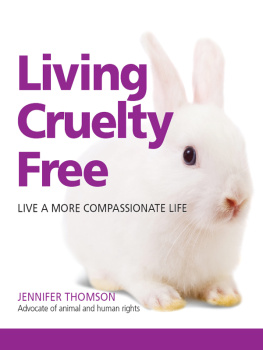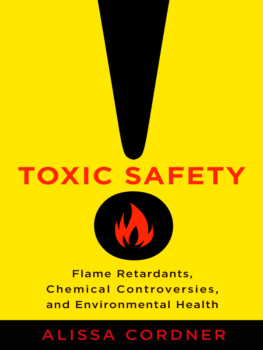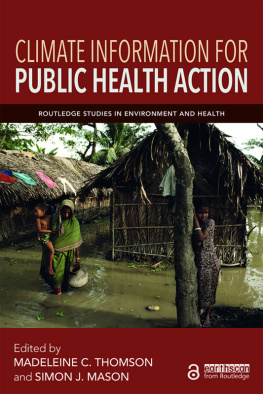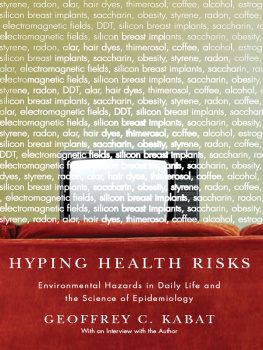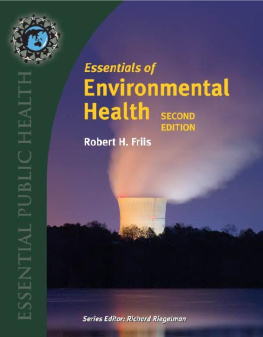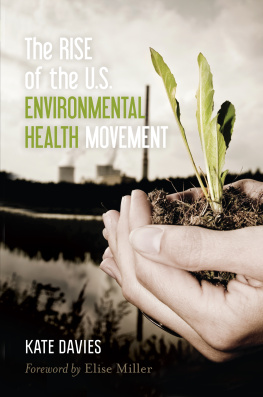Contents
Guide
Pagebreaks of the print version
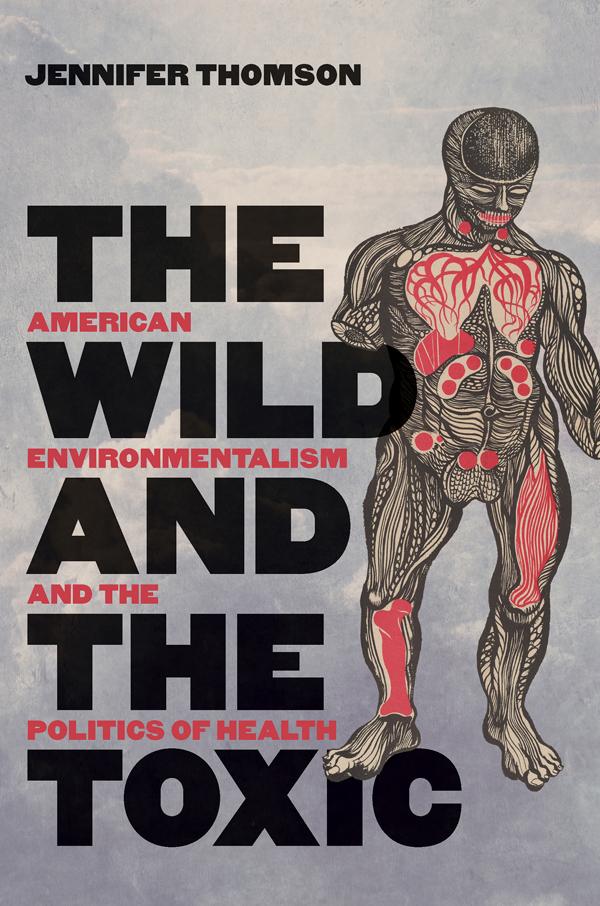
The Wild and the Toxic
The Wild and the Toxic
American Environmentalism and the Politics of Health
Jennifer Thomson
The University of North Carolina Press CHAPEL HILL
This book was published with the assistance of the Wells Fargo Fund for Excellence of the University of North Carolina Press.
2019 The University of North Carolina Press
All rights reserved
Set in Merope Basic by Westchester Publishing Services
Manufactured in the United States of America
The University of North Carolina Press has been a member of the Green Press Initiative since 2003.
Library of Congress Cataloging-in-Publication Data
Names: Thomson, Jennifer (Jennifer Christine), author.
Title: The wild and the toxic : American environmentalism and the politics of health / Jennifer Thomson.
Description: Chapel Hill : University of North Carolina Press, [2019] | Includes bibliographical references and index.
Identifiers: LCCN 2018049282| ISBN 9781469651644 (cloth : alk. paper) | ISBN 9781469651996 (pbk : alk. paper) | ISBN 9781469651651 (ebook)
Subjects: LCSH : Environmental healthUnited StatesHistory. | Environmental healthPolitical aspectsUnited States. | Environmental healthPhilosophy. | EnvironmentalismUnited StatesHistory. | Gaia hypothesisHistory.
Classification: LCC RA 566.3 . T 47 2019 | DDC 362.1969/8dc23
LC record available at https://lccn.loc.gov/2018049282
Cover illustration: Nuclear Man , in Not Man Apart (journal of Friends of the Earth), June 1977, ff QH 540. N 67, courtesy of the Bancroft Library at the University of California, Berkeley, and Friends of the Earth; Grunge Cloud Texture Creative Market/Iaurentzziu.
Gary Snyder, Before the Stuff Comes Down, in Regarding Wave ( 1970 Gary Snyder) is reprinted by permission of New Directions Publishing Corp.
Portions of this book have been previously published in a different form in Toxic Residents: Health and Citizenship at Love Canal, Journal of Social History 49, no. 5 (2016): 20423; and Surviving the 1970s: The Case of Friends of the Earth, Environmental History 22, no. 2 (2017): 23556. Used here with permission of Oxford University Press.
To Willow
Another world is possible
Contents
Figures
Acknowledgments
I owe an enormous debt of gratitude to a far-flung network of activists, scholars, friends, and librarians, whose input, guidance, and encouragement have made this book far richer and more alive than it would have been otherwise.
The original ideas for this book germinated with the generous advice, guidance, and mentorship of Charles Rosenberg, Adelheid Voskuhl, and James Morton Turner. I thank Jay in particular for his continued guidance and feedback as I have moved into a professional career.
This book would not exist without the generosity of its interview subjects. To those who spent hours with me on the phone, welcomed me into their homes and offices, and shared documents with memy heartfelt thanks. Each of you helped me to feel the lifeworlds of environmental politics. Special thanks go to Gary Snyder, who read and commented on an early draft of chapter 3 and invited me to Kitkitdizze for an unforgettable day of conversation about health and life.
I offer my equally deep thanks to all of the librarians and archivists at the SUNY Buffalo University Archives, UC Berkeley Bancroft Library, Yale University Beinecke Library, Science Museum of London Dana Research Centre and Library, Tufts University Digital Collections and Archives, UC Davis Special Collections, and University of Washington Special Collections who made the research for this book possible. Nancy Frazier and Martha Stewart Holland at Bucknells Bertrand Library talked over the research for this project and helped track down sources I otherwise could not have found.
I thank the entire Bucknell history department for its personal camaraderie and professional solidarity. Bucknell University generously supported the final stages of research and writing through the Humanities Center High Impact Research Grant, Bucknell University Publication Subvention Grant, and the International Research Travel Grant. The American Society for Environmental History supported chapter 4 through its 2016 Samuel P. Hays Research Fellowship. Fellow panelists and audience members at the American Society for Environmental History conferences provided insight and context. My editor, Brandon Proia, kept me motivated and the book focused on what really mattered. Heartfelt thanks as well to the books anonymous reviewers for their invaluable commentary.
Nina Banks, Ellen Boucher, Claire Campbell, John Enyeart, Sara Fingal, Cymone Fourshey, Rob Gioielli, Carmen Henne-Ochoa, Deepak Iyer, Sarah Lopez, Darakhshan Mir, Evan ONeil, Leslie Patrick, Josiah Rector, Clare Sammells, Amanda Wooden, and Nikki Young provided encouragement, thoughtful criticism, intellectual community, and sanity throughout the past four years of writing. I finished this book while on untenured leave in Istanbul. Glengl Altnta, Ulus Atayurt, Yetkin Nural, Ali Deniz enoz, and Burcu Temiz kept me sane during that process. Thanks in particular to my parents, who encouraged me even when I was not sure where I was going.
Willow came into this world when this project was in its infancy. She has grown with it, indeed much faster than it has. The seeds of hope lurking in this book are for her.
Mehmet Demeci threw gasoline on the fire of this books argument and unfailingly battled its writers self-doubts. The fight in this book is his as much as mine. Our life together is a wonder.
We live in capitalism, its power seems inescapablebut then, so did the divine right of kings, Ursula K. Le Guin said. Any human power can be resisted and changed by human beings. The practice of history can and should be part of that resistance. Any other choice is violence.
The Wild and the Toxic
Introduction
Health is the substrate for contemporary conversations about the environment in the United States. From climate science to product advertising, pop psychology articles to environmental activism, international climate negotiations to presidential speeches, claims about the health of ecosystems, the health of the planet, and the health of humans within the environment abound. Dr. James E. Hansen, former director of the NASA Goddard Space Institute, argued that reducing global carbon emissions to 350 parts per million is the only way to maintain a healthy environment.
This profusion of claims about the health of ecosystems, the health of the planet, and the health of humans within the environment suggests a generalized sense that humanitys present relationship to the environment is unhealthy. Yet what health specifically means is far from clear. Although the terms wide circulation draws together people of various ideological convictions in what seems to be a universal project, fundamental questions about the meaning of health, to whom it applies, and how it should be measured and protected remain unasked.
This lack of interrogation stems directly from attenuation of the connection between health and specific environmental political struggles. The reason that we apply health to the environment now is the direct result of collective political projects of the 1970s and 1980s. With the dissolution, state-sponsored decimation, and cooptation of these collective projects, health became a vehicle for furthering the individualism and depoliticization integral to the neoliberal project of the late twentieth century. As the demands that made an appeal to a healthy environment or a healthy planet possible in the first place grew distant or were disavowed, the unmoored term became available to projects of consumer capitalism, state and corporate surveillance, and self-regulation antithetical to the previous struggles.


